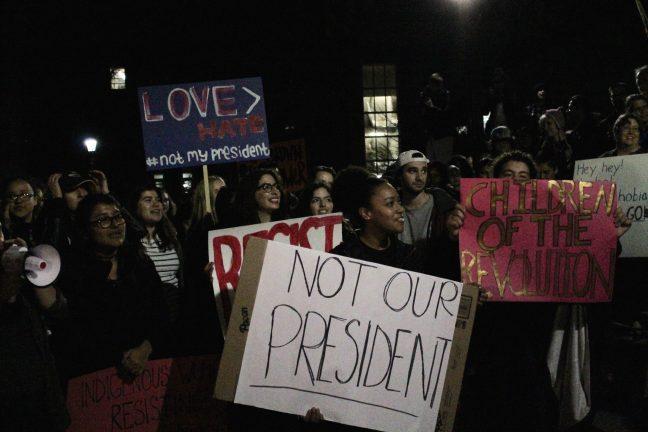President-elect Donald Trump’s campaign began on the historic evening of June 16, 2015.
He stood at the podium in New York City: his face, the hue of toxic citrus, his words, the first stings of a venomous bite. On a blue sign, under the all-consuming “TRUMP,” were four bolded words: “Make America Great Again.” With these four words, on Nov. 8, 2016, he was elected the 45th president of the United States.
“Make America Great Again” provided no tangible hints as to what Trump’s presidency promised — when was America ever great? Greatness implies unparalleled superiority, but in what sense?
In economic equity? No, America’s economic power has always come at a human cost.
In political representation? No, adequate representation for all groups has never been achieved, thanks in part to a perpetual system of targeted disenfranchisement.
Societal satisfaction? There has never, in the entire history of the United States, been a time in which one segment of society has not profited off of the subjugation of another — let’s not forget the prison-industrial complex.
What time period was this slogan recalling?
In the days since the election, political pundits and researchers alike have carried out several analyses in an attempt to piece together a puzzle: Why did more than 60 million people vote Trump? The results, for several of them, seem to be in line with a story of the “forgotten” white man.
This narrative concedes that following the Great Recession, there was a vast population of white, working-class men who were left behind by growing elitism in government dealings. Their woes were ignored on a societal and governmental level. For many of them, Washington D.C. had fallen to the whims and wants of lobbyists and corporations.
Trump, evidently, provided them with an opportunity to take back Washington. The words in his slogan, “Make America Great Again,” washed over them a wave of potent nostalgia for a time in which these white men had been the deciding factors in this country’s democratic system.
That narrative is problematic. Far from having a sincere grassroots campaign that aimed toward the betterment of Americans, Trump made himself an unfortunate legacy of targeting and denigrating almost every minority group in the country.
Instead of using your privilege to flee America, use it to change America
In some of his most painful and horrifying moments, Trump labeled Mexican immigrants “rapists” and “criminals,” called for a Muslim registry (which might soon be a reality), referred to black neighborhoods as “war zones,” told the crowds at one of rallies to “knock the crap” out of a protester and was exposed as a man who openly and casually discusses sexually assaulting women (i.e. “Grab them by the pussy”). Going beyond the verbal, Trump has been accused of sexual assault and harassment about a dozen times.
Were these comments and actions far-removed from the “forgotten” white man’s reasons to vote for Trump?
To answer this question, let’s take a step back and consider white man’s nostalgia. This longing for a time of political say-so and economic prosperity stems from a current feeling of powerlessness. Sure, this is understandable. The Great Recession left no middle-class, or low-income household untouched, and a good portion of citizens feel their political wills unanswered by the government. Understandable.
But the situation is more complicated than that. For many Trump voters, social occurrences like immigration, terrorism and crime rates, among other things (China?) were to blame for this country’s downfall. Immigrants stealing jobs, terrorism contributing to a feeling of insecurity and a consumption of government funds, crime rates making American cities unsafe.
Okay, these opinions have existed for a long time — what’s the big deal? Here’s where we look back on the comments Trump made during his campaign.
The problems of white, working-class men were even given faces, and these faces belonged to the minorities that Trump leeched off of to fuel his hateful words. Mexicans were blamed for taking jobs and committing violent crimes. Muslims were condemned as the source of all violent extremism. Black communities were generalized as America’s most violent enclaves.
The facts to counter Trump’s claims: immigrants expand the U.S. workforce, which increases economic efficiency. Additionally, immigrants are less likely to commit crime at lower rates than native-born Americans. Being killed by your furniture is more likely than being killed by a terrorist, and white males are the biggest threat of terrorism to the American people. Black communities are not a monolith, and violent crime is not a stand-alone — it feeds off of deep poverty and despair.
As for higher crime rates, former Presidents Ronald Reagan and Bill Clinton-era policies indiscriminately targeted people of color in the criminal justice system. Despite the falsity of Trump’s claims, the damage of his campaign is lasting, and will have serious consequences.
White-male nostalgia is dangerous, and the “forgotten” white man cannot be used as justification for Trump’s election. The words the now president-elect spewed convinced many white men and women that their problems, economic and social, stemmed from the existence of minorities.
Does this sound familiar? Think, post-World War I Germany: economic catastrophe, one man, the scapegoating of minorities and nostalgia for a time of prosperity.
The aftermath of this campaign has been telling, with hate crimes steadily on the rise and a government administration that the Ku Klux Klan endorsed. Trump utilized this country’s weaknesses and profited. He built off of existing stereotypes and legitimized them. What seemed ambiguous in “Make America Great Again,” is now transparent. The slogan was a call to organize this country, once again, into a society for the white men, by white men.
But that’s not the country I’m interested in living in.
Mehak Qureshi ([email protected]) is a junior majoring in international studies.














